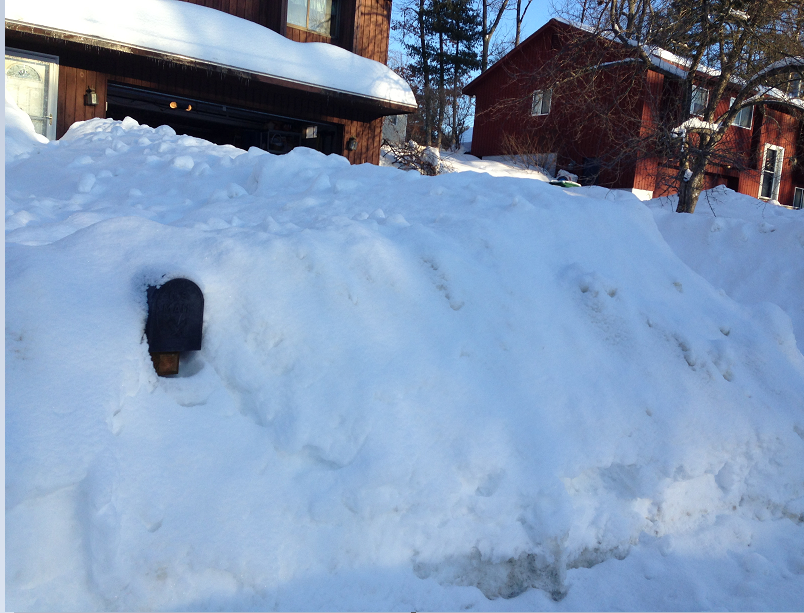A Flurry of Snow Day Language Thoughts Posted by Transparent Language on Feb 23, 2015 in Archived Posts
You’ve probably heard the old claim that “Eskimos have dozens (or hundreds) of words for snow”… it was on my mind this morning as I looked out at the white stuff threatening to bury my driveway. Never having studied Inuit, Yupik, or any other Native Alaskan language, I’m not going to wade into that particular debate, but it did get me thinking… English is no slouch when it comes to snow terms, either.
Think about it – we’ve got snow, slush, sleet, frost, and freezing rain – and in a lot of the US, you’ve probably seen most of those in just the past week! Furthermore, all that frozen precipitation can come down in snowstorms, snow showers, flurries, or blizzards, can be shaped into snowballs or snowmen, and can lie on the ground in snowdrifts, snowbanks, or even plow banks. In addition to being the bane of shovelers everywhere, that last is a great example of a modern term as specialized as anything the ancient Alaskans might have uttered – it neatly sums up the concept of “snow in mounds beside roads or across driveways after being pushed there by a snowplow” in just two simple syllables.
A scattering of snowflakes can be a dusting; extreme amounts snowfall over time can form a mountain’s snowcap or even a glacier. Speaking of mountains, we haven’t even gotten into the myriad of skiing terms: powder, granular, hardpack, and no doubt many others – like the Native Alaskans of old, skiers need to make fine distinctions when it comes to the surface their hobby depends on.
That, of course, is the linguistic concept at the heart of the old Eskimo cliché – the idea that a language may naturally evolve more terms for things that are more common, or more important, in the places where it is spoken. It makes sense – a wide vocabulary allows speakers to more easily convey details about the matters that concern them most. It doesn’t always happen, and it’s perfectly possible to talk about, say, “snow that is good for driving a sled” using a full phrase rather than a specialized term – but if you had to discuss such matters everyday, the Inuit word piegnartoq certainly would be convenient.[1]
Of course, this tendency is certainly not unique weather words, but they do make good examples – it’s no surprise, for example, that Icelandic has more words and idioms related to winter weather than, say, Arabic or Hawaiian, while a language like Spanish is somewhere in the middle. (You can see some fun Icelandic terms here in one of our Icelandic blogger’s posts, and some Spanish terms in a vocabulary list that I made here.) Meanwhile, a language like English, with speakers spread across vastly different climates, is going to pick up specialized terms for all sorts of different weather events, though some of them may be regional is usage.
What about the language you’re studying? Does it have more terms for hot weather or cold? Are there any non-weather subjects it seems to specialize in? Did I leave out your favorite winter word, or are you just tired of this season’s frozen nonsense and ready to let it go? Sound off in the comments!
[1] http://www.washingtonpost.com/national/health-science/there-really-are-50-eskimo-words-for-snow/2013/01/14/e0e3f4e0-59a0-11e2-beee-6e38f5215402_story.html

Build vocabulary, practice pronunciation, and more with Transparent Language Online. Available anytime, anywhere, on any device.





Comments:
Mel:
It would be interesting to know how many words a beduin has for “sand”
Janet Whatmough:
@Mel It would be!
Cathy Wilson:
Wow. We are feeling your pain. Enjoyed reading the blog. And best of luck when the thaw comes.
Janet Whatmough:
@Cathy Wilson Thanks! That’s my mailbox buried there… Here’s hoping the thaw comes soon!
Ruth Freeburg:
I find it interesting that the weather in Germanic languages (at least the two I speak) is attributed to something else-“it” is raining or snowing, not just “snowing” today. English-“It’s raining.” Norwegian “Det regner.” Could this be attributed to belief in an outside source in control of the weather? Norse gods or what-have-you?
Janet Whatmough:
@Ruth Freeburg Interesting thought!
I’d never stopped to ponder what that “it” referred to, beyond “the weather” in general. =-)
Marit:
@Ruth Freeburg “OK, so what about It’s raining? It’s a kind of construction called a Dummy it.That is, the it has no meaning whatsoever (you’re far from the first to be puzzled by it) and is used strictly as a placeholder, […] English Syntax has this Rule that says […] Thou Shalt Have A Subject In Every Finite Sentence.” (source: http://www-personal.umich.edu/~jlawler/aue/itsraining.html)